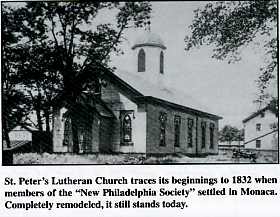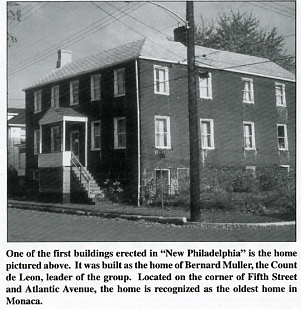
Click Here to Return to Milestones
Although Monaca had been a temporary home to
many people, the first permanent settlers did not arrive until
1832. Then the town was called Phillipsburg. It was nothing more
than a patch of abandoned wooden structures which had housed the
workers of Stephen Phillips, a builder of quality river boats.
The 1832 founders were members of a German brotherhood, the New
Philadelphia Society (NPS). The majority of them had seceded from
the Harmony Society, Georg Rapp's commune at Economy. But other
Germans were charter members of the NPS as well. Many of them
had gone to Economy early in 1832, intending to join Rapp. When
they found the Harmony Society in a state of turmoil, they cast
their lot with the seceders instead.
The congregation arrived at Phillipsburg with a constitution in
hand and a vision in mind. Their leader was Count Leon. Half a
year earlier, he had brought a delegation of about 40 people to
visit Economy. When he left, his following numbered in the hundreds.
Like Georg Rapp and other intellects of the day, Leon had a great
interest in alchemy - the changing of common rocks into gold.
All believed that such a feat could happen, but only in the presence
of the "philosopher's stone," the mystical catalyst
which no one had yet found. Leon claimed to possess this miraculous
piece of earth.

To complement the property purchased from Stephen Phillips, the
New Philadelphians bought three adjoining parcels of vacant land,
giving them plenty of acreage along the Ohio River. The real estate
was acquired for speculation, since their plan was to remain only
for a year while they collected their severance from Georg Rapp.
They had agreed to a settlement of $105,000, to be paid in three
installments of $35,000 each, six months apart. They lamented
that the amount was far from satisfactory to compensate for years
of labor and endowments of all earthly possessions (a condition
of membership). But the seceders were anxious to get on with their
plan, so they agreed to the terms.
The first installment was received a month late, and was substantially
less than had been negotiated. The Phillipsburgers were able to
recoup some of the difference, and were optimistic that an adjustment
would be made in the remaining two payments. Meanwhile, they paid
off the property, advertised nationally for new members, and made
a few improvements to the town: a church, a new house for Leon,
and a cemetery. In addition, they re-erected the Count's alchemy
laboratory, which had been shipped down from Economy at an unexpected
expense. Leon spent his time endeavoring to transform rocks into
gold.
Although the New Philadelphians were excellent farmers and manufacturers,
they planted no crops and built no factories. Just a few artisans,
such as the tailors and the blacksmiths, carried on with the work
they had done at Economy. The new society had no need for the
long-range enterprises of agriculture and industry. Their plan
was to be gone shortly after March 6 of the following year, when
their nest egg was in hand, and untold wealth had resulted from
the promised gold.
The New Philadelphia Society was dealt another blow when allegations
of fraud were brought against Leon. Through deft detective work,
the business manager for the Harmony Society (Friedrich Rapp)
had discovered that the Count was no nobleman. His true identity
was Bernard Mueller; his parentage was dubious, and he had used
a variety of names over the course of his life. Worst of all,
he had run from Europe in the heat of scandal. Friedrich used
this information to damage the reputation of the NPS, and to hold
up their final installment.
Already the New Philadelphia Society was in a financial quagmire.
Leon had squandered his society's money and borrowed heavily against
their assets. Dozens of people had resigned, and according to
contract, had been repaid the entire amount they had endowed at
joining as well as compensation for their labor. Most of Phillipsburg's
residents were openly expressing disgust, including those who
had come with the Count from Germany. Scores more quit the NPS.
In spite of this, Leon retained his power; in fact, one community
leader (the former Harmonist, Jacob Wagner) openly extolled the
Count's virtues many decades later.
The spring of 1833 found Phillipsburg in a sorry state. Not only
had Leon failed to produce gold, but the final settlement was
held up: Friedrich Rapp had imposed a string of caveats and was
reneging on the agreed amount. The townspeople were starving and
needed medical supplies. The situation was especially critical
since several dozen of their young women were pregnant. At first
the seceders attempted to resolve their problem with diplomacy,
claiming that since their tie with the Harmony Society had not
been severed, they were still under their original contract; this
entitled them to food and medical care. That tactic failed. Next
they determined to approach Economy, at least to procure some
food.

But Georg Rapp was not interested in dealing with the New Philadelphia
Society. When their forty or so representatives reached Economy
on April 2, they saw just a handful of Harmonists, mostly women
and old men, and some visitors to the town. First the Phillipsburgers
visited Rapp's house and the living quarters of the tavern keeper,
but their knocks went unanswered. As tension mounted, agitation
turned to fury. According to eye witness accounts, the encounter
included threats, brandishing of weapons, and even blows. Some
seceders broke into the tavern and took food. The fracas ended
when the militia arrived. The offenders were bound over, and some
of them, including Leon, were slated for trial in September.
By summer, The New Philadelphia Society was still limping along
at Phillipsburg. But all of these strains had taken their toll.
On August 18, the brotherhood officially dissolved. Two weeks
later, the Count and many of his still-faithful supporters boarded
flatboats and headed for Louisiana. The few who remained in Phillipsburg
- the true founding fathers of Monaca - were left to resolve matters
with Rapp, pay off the many debts, build themselves a real town,
and get on with their lives.